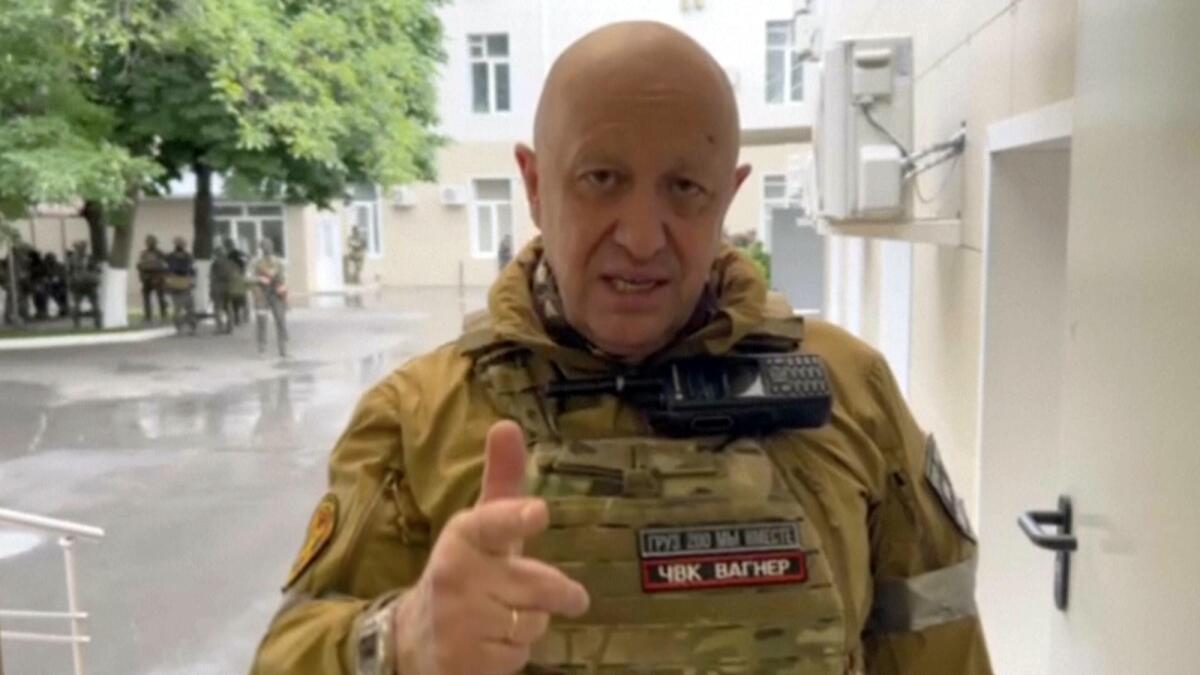Kremlin says Putin met with Russian mercenary leader days after abortive mutiny

- Share via
KYIV, Ukraine — Russian President Vladimir Putin met with Wagner leader Yevgeny Prigozhin days after a short-lived rebellion by the mercenary chief and his private army, the Kremlin’s spokesman said Monday.
The three-hour meeting took place at the Kremlin on June 29 and also involved commanders from the military company Prigozhin founded, Kremlin spokesman Dmitry Peskov said.
Wagner mercenaries have fought alongside Russian troops in Ukraine. Prigozhin has a long-simmering feud with Russia’s top military brass which on June 24 culminated in an armed mutiny in which he led his fighters into Russia.
Prigozhin ended the mutiny after a deal was brokered for him to be exiled to Belarus.
The confirmation of a face-to-face meeting with Putin, who has branded Prigozhin as a backstabbing traitor, adds a new twist to the uncertainty surrounding the mercenary chief. His fate and whereabouts have been unknown since the abortive mutiny, which severely weakened Putin’s authority.
Peskov said that during the June 29 meeting, Putin offered an “assessment” of Wagner’s actions on the battlefield in Ukraine and “of the events of June 24.” The president also “listened to the explanations of the commanders and offered them options for further employment and further use in combat,” the Kremlin spokesman said.
“The commanders themselves presented their version of what happened. They underscored that they are staunch supporters and soldiers of the head of state and the commander-in-chief, and also said that they are ready to continue to fight for their homeland,” Peskov said.
A total of 35 people took part in the meeting, including Wagner commanders and the leadership of the company, namely Prigozhin himself, Peskov said.
Also Monday, Russia’s Defense Ministry published a video featuring the country’s military chief — the first time Gen. Valery Gerasimov was shown since the rebelling aimed to oust him.
During last month’s revolt, Prigozhin repeatedly denounced Gerasimov, who serves as chief of the general staff of the Russian armed forces, and Defense Minister Sergei Shoigu for failing to provide his fighters in Ukraine with ammunition.
Monday’s updates appeared to be an attempt by Moscow to take control of the narrative after a turbulent period.
Meanwhile, a Russian airstrike on a school in southern Ukraine killed four adults as people gathered to receive humanitarian aid, the governor of Ukraine’s Zaporizhzhia region said Monday, branding the incident “a war crime.”
Three women and a man, all in their 40s, died in Sunday’s attack in the town of Orikhiv, Gov. Yuriy Malashko said.
A guided aerial bomb caused an explosion at the school, Malashko said, without providing evidence. Eleven other people were wounded in the attack, he said.
Overall, Russia fired on 10 settlements in the province over the course of a day, he said.
Moscow denies it targets civilian locations. Russia has been accused numerous times of doing so and committing other war crimes since its full-scale invasion of neighboring Ukraine in February 2022.
In March, the International Criminal Court issued an arrest warrant for Russian President Vladimir Putin for war crimes, accusing him of personal responsibility for the abductions of children from Ukraine.
Broad investigations are also underway in Ukraine, Estonia, Latvia, Lithuania and Poland. The International Center for the Prosecution of the Crime of Aggression against Ukraine, located in The Hague, is helping with those investigations.
Zaporizhzhia province is home to Europe’s largest nuclear power plant, which Russian forces seized early in the war, and is one of four regions of Ukraine that Putin illegally annexed last year. Retaking the province is one of the targets of a Ukrainian counteroffensive.
Russian aerial assaults continued across Ukraine between Sunday and Monday, according to a summary from the Ukrainian presidential office.
In the Donetsk region, the Russians used aircraft, missile systems and heavy artillery to shell residential areas of 6 cities and villages, injuring one person, the office reported.
The Russian army attacked residential areas of Kherson, the regional capital of a province of the same name. A 66-year-old woman was injured, the presidential office said.
___
Follow AP’s coverage of the war in Ukraine at https://apnews.com/hub/russia-ukraine
More to Read
Sign up for Essential California
The most important California stories and recommendations in your inbox every morning.
You may occasionally receive promotional content from the Los Angeles Times.













